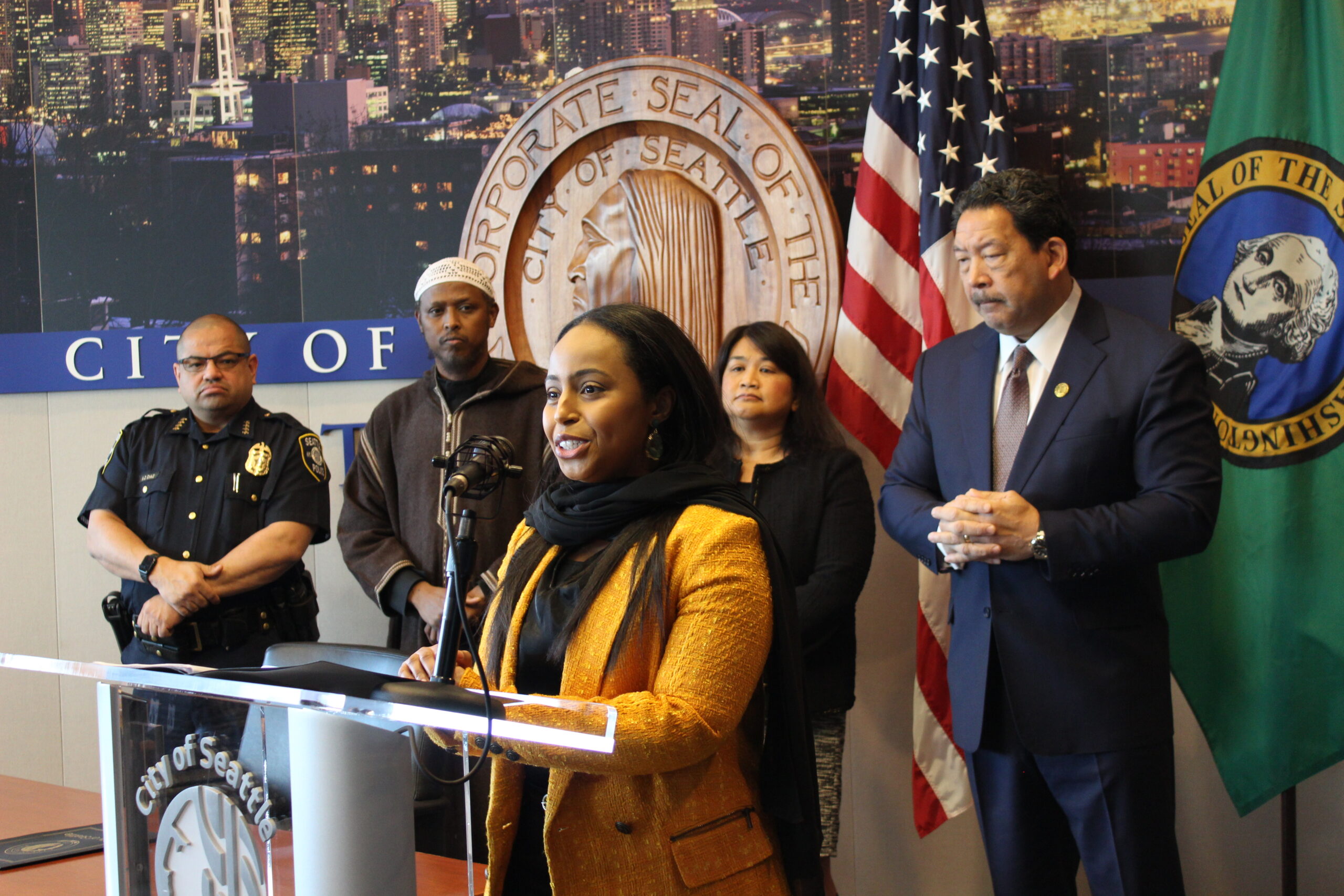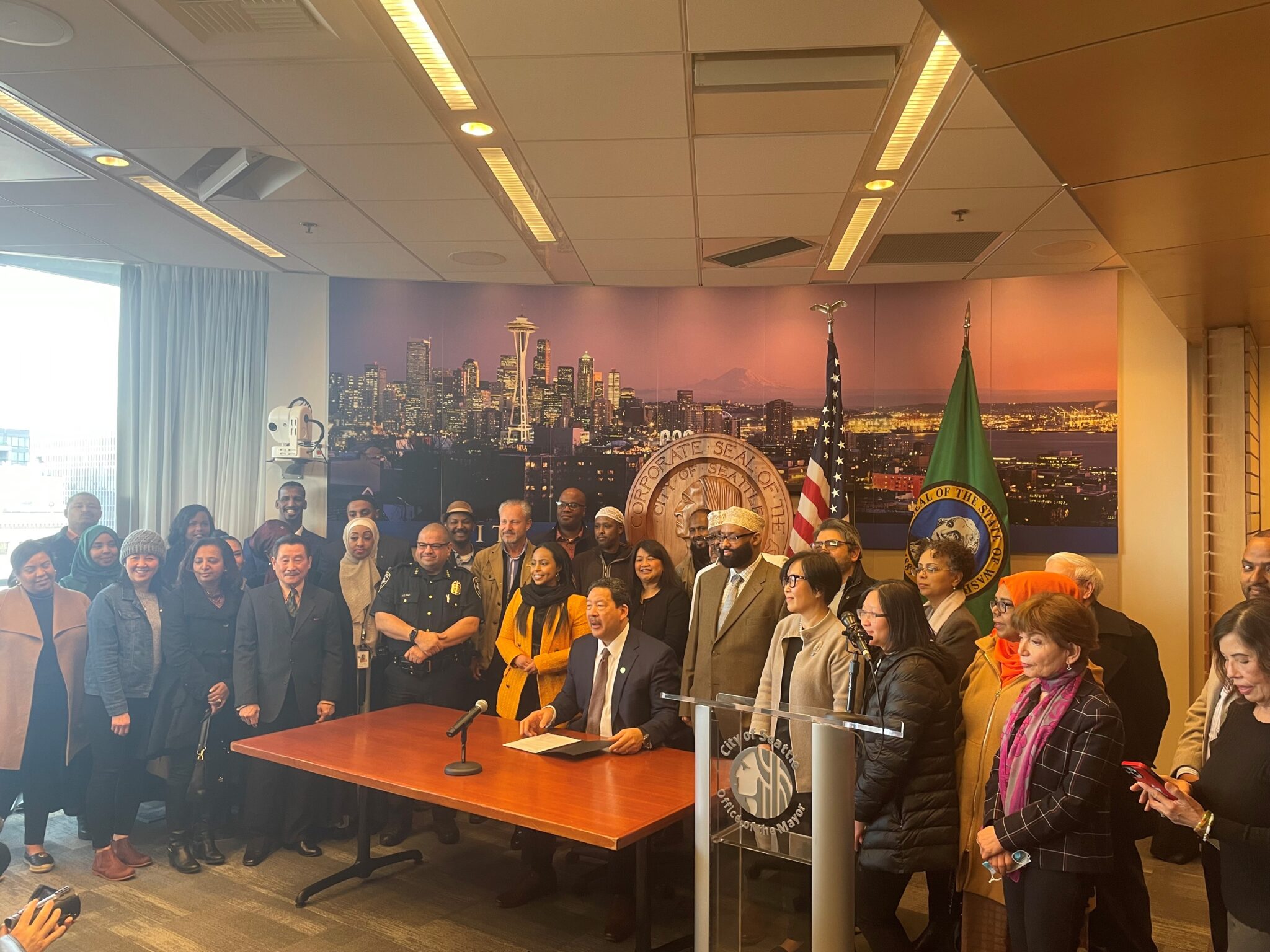

Updated 10/28/2022
About the New Citizen Campaign
NCC LOI Zoom Information Session Video Recording
FAQ (Frequently Asked Questions)
Applications due on Friday, October 28, 2022, at 5:00 PM
The Office of Immigrant and Refugee Affairs (OIRA) seeks Letters of Intent (LOI) from community-based agencies interested in contributing to a stronger network of naturalization services in Seattle in 2023 and 2024 through the New Citizen Campaign (NCC).
About the New Citizen Campaign
The New Citizen Campaign (NCC) is one of two citizenship program models within OIRA. NCC seeks to increase the numbers of immigrants and refugees who naturalize and engage in civic processes, utilizing multiple strategies that include providing naturalization assistance through group processing clinics and workshops, conducting broad-based outreach, promoting the benefits of citizenship, and engaging with local and national partners.
NCC also seeks to build strong partnerships among partner organizations to support a collaborative network (referred to here as “table”) of citizenship service providers in Seattle. NCC services complement and work in alignment with OIRA’s New Citizen Program (NCP), a case-management naturalization service model.
2023-24 Program Goals
NCC’s focus is on expanding access to the U.S. citizenship application process, with the intent to serve immigrant and refugee populations that do not currently access citizenship services or have newly become eligible to naturalize. NCC also places a high priority on serving the geographic regions of the city where fewer such services are available.
- NCC partners will be a part of a collaborative table that helps shape and strengthen the work of the Campaign.
- NCC will continue to offer citizenship application assistance clinics in 2023 and 2024. NCC clinics offer an alternative to traditional case management legal services, and most applicants end up filing their applications without ongoing legal representation. This “low-touch” approach increases access to citizenship services to low- and middle-income residents who are not eligible for other free naturalization services, but who cannot afford private legal assistance.
- NCC also aims to support participants on the path to citizenship through education about the citizenship process and benefits, help in collecting the necessary information and documents, and referrals to upcoming clinics or case management services, according to their individual needs.
Who Should Apply?
Applicants must meet the following minimum qualifications:
- Be a nonprofit organization with a 501(c)3 status or have a fiscal sponsor with a 501(c)3 status.*
- Have prior experience providing naturalization or citizenship navigation services in Seattle.
- Have an interest in supporting naturalization through collaborative and innovative approaches.
*The City of Seattle requires both fiscal sponsor and organization providing services to sign the NCC contract and for fiscal sponsor and organization providing services to have a written agreement between them defining roles.
Contracts and Funds Available
Total anticipated funds available: $240,000 per year subject to the continuing appropriation authority of the Seattle City Council. Typical NCC contract awards range from $15,000 to $20,000 annually.
Contract period: January 2023 to December 31, 2024. Funding for 2024 will be contingent upon performance and Seattle City Council budget appropriation.
Application Materials (2 Documents)
The LOI Application Guidelines provide detailed information about the program and requirements for this LOI.
The Application Cover Sheet and Narrative Questions include all the information required form each applicant and instructions for providing responses.
A Letter of Intent (LOI) to the New Citizen Campaign must include the following (outlined in the Application Cover Sheet):
☐ Proposal cover sheet
☐ Current IRS 501(c)3 letter or other proof of 501(c)3 status (yours or your fiscal sponsor’s)
☐ A letter signed by your fiscal sponsor that confirms their fiscal sponsorship of your group, if applicable
☐ Proposal narrative (maximum 5 pages)
☐ Project budget (using the attached form)
Submission Instructions
LOIs are due to the Office of Immigrant and Refugee Affairs by 5:00 PM on Friday, October 28, 2022. LOIs received after this deadline will not be considered.
Application packets must be sent by email in PDF format to OIRARFP@seattle.gov. Proposals must be received complete and by the 5:00 PM deadline to be reviewed for funding consideration. The application packet should be emailed. Please contact us by email at OIRARFP@seattle.gov or by phone at (206) 684-5705 if your agency requires any accommodations related to preparing or submitting this application, which must be granted in writing at the sole discretion of OIRA.
NCC LOI Zoom Information Session Video Recording
On September 20, 2022, OIRA held a Zoom Information Session for interested organizations to ask questions about the LOI process and about NCC. We have made the session available here for other organizations who were not able to attend and who might have similar questions.
FAQ (Frequently Asked Questions)
Updated 10/6/2022
The below questions were submitted from prospective applicants either during the September 20th Information Session or submitted to OIRA through other means, such as email. In the interest of transparency, we have included the questions and our answers below. We shall add to the FAQ list as we receive additional questions.
1. Is this a different source of funding than NCP?
Yes, OIRA has two citizenship programs: New Citizen Campaign (NCC), which is the current open LOI process and New Citizen Program (NCP). Both programs receive funding from the City of Seattle General Fund, but they are two separate programs for the purposes of this LOI and subsequent contracts.
2. What’s the difference between NCC and NCP? Is this the clinic model?
NCC is based on a “clinic model” of services. The differences between NCC and NCP are discussed in the LOI Guidelines document under the Background and 2023-24 Program Goals sections.The most important differences between NCC and NCP are that:
- NCC serves participants through one-time, limited services, such as in a legal clinic while NCP provides ongoing legal representation to clients.
- NCC serves participants whose cases are straightforward enough to apply for citizenship without ongoing representation or case management legal services such as those provided by NCP.
- NCC serves participants who are not eligible for NCP services but who are low- and middle- income residents who cannot afford private legal assistance.
3. We have DOJ-accredited representatives on staff, but no attorneys. If we were to co-lead a clinic, would it be allowable to partner with an agency with attorneys?
Yes, at least one of the agencies co-leading a clinic must have either a DOJ-accredited representative or an attorney on staff managing the legal aspects of the clinic. Having a DOJ representative on staff of one of the co-lead agencies is sufficient. An agency without any legal staff should plan to partner with an agency with legal staff to host a clinic.
An agency does not need to have a firm partner in mind in order to apply to be a clinic co-lead agency. However, they must be willing to be paired with another NCC partner agency once contracts are signed. For example, an agency without legal staff can apply to be a clinic co-lead without a firm idea of who their partner would be, as long as they acknowledge that they will need to be paired with an agency with legal staff in order to plan and run the clinic.
4. Is there a list of volunteer attorneys who can help with clinics?
As found in the LOI Guidelines document within Appendix I – Scope of Work Details, and Appendix II – Clinic Options Menu, clinic co-lead partner agencies are responsible for volunteer recruitment, but OIRA will assist as possible.
NCC and OIRA have worked with many volunteer attorneys over the years along with American Immigration Lawyers Association of Washington (AILA-WA) for help recruiting attorneys and will continue to do so. NCC has worked less frequently with volunteers in the past two years due to limited event size for COVID-19 precautions, which makes volunteer recruitment more challenging.
5. Is $20,000 the maximum contract amount available?
Within the LOI Guidelines Overview and Contract sections, the typical range for NCC contracts is listed as $15,000 to $20,000. Contracts can be larger or smaller than that range, but this is listed to give applicants an idea of what is common for most NCC contracts. NCC contracts are typically not large enough to sustain a full- or part-time staff person but are reflective of the project-based work of preparing NCC clinics. Applicants may propose funding amounts under $15,000 or over $20,000.
6. If we are thinking of this as a network, with different organizations with different roles, will there be quarterly meetings to let everyone know how participation is going?
Yes, there are regular meetings between NCC partners. Current partners participate in monthly 2-hour meetings—the first hour is open for regular agenda items, and the second is held to discuss policy or case questions. We have tried different models in the past, and we are open to hearing other ideas. The emphasis is on checking in with one another. Until we get contracts in place, this won’t be finalized, but we will likely continue to have once-a-month meetings.
7. How many clinics in a year are we anticipating?
We will have completed 8-9 clinics for this year (January 2022- October 2022). There has been one clinic a month along with one mini-clinic.
Currently, partners are using a mix of remote and in-person services, and typically 20-25 participants are served per regular clinic. Five to ten participants are served during mini-clinics. Many partners hold two clinics per year, sometimes three. Clinic work fits outside of an organization’s case management model, so 2-3 clinics annually has seemed to work well for many organizations.
8. With the advent of COVID, some groups have organized “rolling” clinics where services are provided over the course of the month to align with attorneys’ schedules, as opposed to a single day event. Are the former types of clinics permitted?
Yes, both types are acceptable. The type of model just influences how you would plan and execute the clinic. For the purposes of the LOI, the focus should be on which model best meets the needs of the community you wish to serve. Flexibility is still very important. For example, community members might need a remote option because they are working and can’t attend a weekend in-person event. On the other hand, a remote model using Zoom meetings would not be a good fit if members of your community face technology barriers.
9. Do you want organizations to submit the LOI together, if they are planning on working together? If we just wanted to do technical assistance and would be open to partnering with anyone, is that allowed?
Assuming both partners want to receive funding, both should apply. OIRA may ask selected applicants to work in specific partnerships. If you already have an idea of who you want to work with, please include that in your application. You can specify a specific type of organization that you’d like to support (with navigation and referral for example) or you can name a specific agency, or neither, if you don’t have a preference. It’s great if you coordinate with one another, but it is not necessary.
10. Can we use subcontractors?
Subcontractors will not be permitted for this funding opportunity.
11. We are a nonprofit, and part of our work involves managing a public radio station. Can we apply for this funding?
That is something you can propose. This could be part of a proposal for Clinic Leadership or for Citizenship Navigation, or could potentially fit into Technical Assistance (TA). In general TA is a bit more open-ended, while clinic leadership and navigation work is a bit more prescriptive. NCC values innovation and trying new things, but please read through the Guidelines document carefully to ensure your proposal fits within whatever role you propose to fill. Additionally, NCC has traditionally worked with ethnic media outlets for paid and earned media to promote the clinics.
12. I work for a large organization. Is it possible to submit multiple applications for a single organization, or just one?
Our preference is that each organization submit just one application, to help organize the panel’s review and minimize contract administration workload. If the structure of the organization is separate, it would be permissible to follow that structure, especially if applying for different roles. OIRA would be unlikely to award multiple, distinct contracts to the same organization for NCC, although exceptions are possible if serving different populations, etc.
13. For a single agency applying for multiple roles, should each application be within the $15,000-$20,000 range, or should we stay within that range overall?
The $15,000-$20,000 range is just for reference. Awards could be smaller or larger. Please keep in mind that the total funding available is $240,000 and we fund multiple agencies. OIRA reserves the right to offer selected applicants contracts above or below the amount specified in the application and will work with all successful applicants to effectively and equitably distribute available funding.
14. Is there a requirement for the agency to have an attorney on its staff or board in order to be considered for the RFP?
An agency is not required to have an attorney on their staff or board in order to be considered for funding. Minimum qualifications for applicants are listed below.
- Be a nonprofit organization with a 501(c)3 status or have a fiscal sponsor with a 501(c)3 status.
- Have prior experience providing naturalization or citizenship navigation services in Seattle.
- Have an interest in supporting naturalization through collaborative and innovative approaches.
Appendix I in the NCC LOI Guidelines document describes the different roles among NCC partners: Clinic Leadership and Implementation, Citizenship Navigation and Participant Preparation, and Technical Assistance and Legal Expertise. Note that if an agency without any legal staff wanted to co-lead a clinic, they would be required to partner with an agency with legal staff.
15. Are you looking for a place to have clinics and workshops?
We are most definitely looking for places to host clinics. In the past, we have worked with community centers, places of worship, and other community-based organizations to host events. We welcome free spaces but also make some room in the budget to pay for space rentals and/or staffing. If you are interested in collaborating in this way, this would most likely fall outside this Letter of Intent process unless there is interest in supporting the other aspects of clinic leadership or other NCC roles as outlined in the LOI Guidelines document.
16. Our agencies would like to work together to hold one or two events to meet the NCC contract goal. We think both agencies will provide the three services listed on the guidelines: 1) Clinic Leadership and Implementation 2) Citizenship Navigation and Participant Preparation 3) Technical Assistance and Legal Expertise. It is possible that one agency might do more in one type of service, but none of us can only provide one type of service without touching the others. Therefore, we are wondering whether both agencies can apply for all three kinds of service in its own LOI.
Assuming both partners want to receive funding, both should apply. OIRA may ask selected applicants to work in specific partnerships. If you already have an idea of whom you want to work with, please include that in your application.
It is fine for both agencies to apply for all three roles or services listed in the LOI Guidelines. Please read the LOI Guidelines within Appendix I – Scope of Work Details carefully and the application questions related to each role. Many of the duties required to complete a clinic in the Clinic Leadership and Implementation role are closely related to the work required for Citizenship Navigation and Technical Assistance roles. For example, offering feedback on case questions or participant eligibility to your co-lead agency for your own clinic would typically fall within the scope of Clinic Leadership and Implementation (not Citizenship Navigation or Technical Assistance). On the other hand, providing technical assistance to the broader NCC table or other partners would likely fall under the Technical Assistance role.
Additionally, offering insights and feedback to the group in meetings and debrief conversations is part of the expectations of NCC table participatio, and would not constitute services under the Technical Assistance role.


